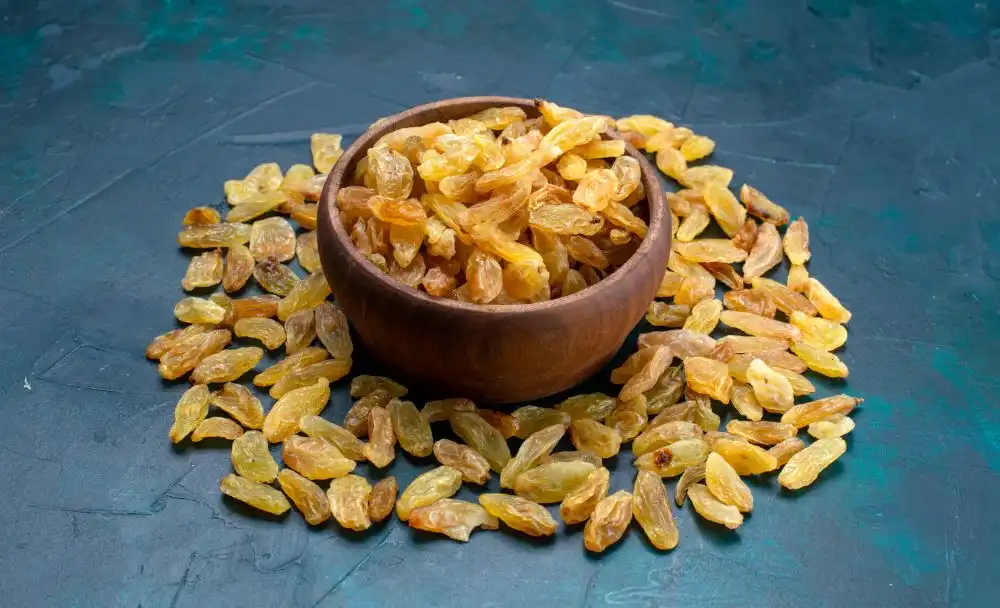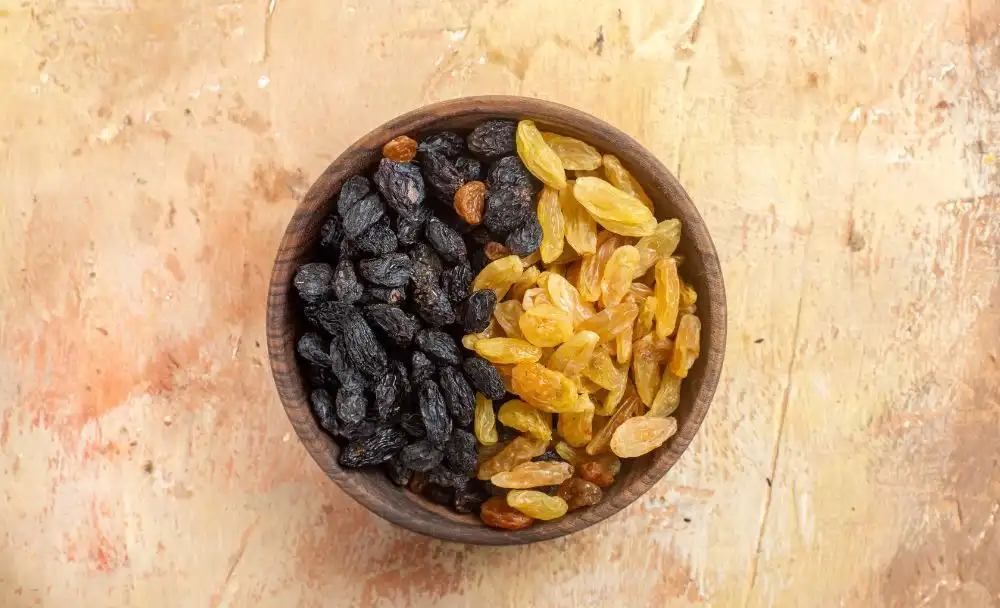
This article is reviewed by an expert
Munakka or raisins are nothing but dried grapes. They are produced by drying grapes either in the sun or through a dehydration process. Munakka dry fruit is commonly used in cooking, baking, and as a snack food. They have a sweet and slightly tangy flavour. There are plenty of Munakka benefits to explore because of their high and complex nutritional content.
Health Benefits Of Munakka
Anaemia Prevention
Primary Benefit: Munakka are rich in iron, copper and B complex vitamins, which are essential for the production of red blood cells and haemoglobin. Eating Munakka regularly can help prevent or treat anaemia, a condition that is extremely common in India.
Digestive Health
Primary Benefit: Munakka are a good source of dietary fibre, which can help improve bowel movements and prevent constipation 1. Fibre also feeds the beneficial bacteria in the gut, which can enhance digestion and immunity. Munakka also have a laxative effect due to their high content of tartaric acid.
Acidity Reduction
Primary Benefit: Munakka are alkaline foods, meaning they can help balance the pH level of the body and reduce acidity. Acidity can cause various problems such as indigestion, heartburn, ulcers and inflammation. Munakka provide potassium and magnesium, which are alkaline minerals that can neutralize excess acid in the stomach 2.
Energy Boost
Secondary Benefit: Munakka are high in natural sugars and carbohydrates, which can provide a quick and sustained source of energy for the body. Munakka also have vitamins and minerals that can support metabolism and cellular functions. Eating Munakka before or after exercise can help replenish the glycogen stores in the muscles and liver.
Heart Health
Secondary Benefit: Nutrients such as potassium that are present in Munakka are believed to lower blood pressure, allowing the blood vessels to relax. Blood pressure control is also important to lower the risk of heart disease and this benefit of Munakka has also been highlighted in studies 3.

Lower Blood Sugar
Secondary Benefit: Despite the fact that Munakka fruit is a sweet treat to many, research suggests that a small intake may actually help to control or lower blood sugar levels 3. This is surprising as Munakka actually contain a higher concentration of natural sugars than many fresh fruits.
Dental Health
Secondary Benefit: Munakka have oleanolic acid, a phytochemical that can inhibit the growth of oral bacteria that cause tooth decay and cavities 4. Munakka also stimulate saliva production, which can wash away food particles and plaque from the teeth and gums. Munakka also have calcium and boron, which can strengthen the enamel and prevent tooth erosion.
How To Add Munakka To Your Diet
There are various ways to incorporate Munakka into your diet. Here are some ideas:
- Snack on them: Munakka make a convenient and portable snack on their own. You can enjoy them as is or mix them with other nuts and seeds for a healthy trail mix.
- Add to cereal or oatmeal: Sprinkle Munakka on your morning cereal or mix them into your oatmeal for added sweetness and texture.
- Use in baking: Munakka are commonly used in baking recipes such as cookies, muffins, bread, and cakes. They can add moisture and natural sweetness to your baked goods.
- Include in salads: Toss Munakka into salads for a burst of sweetness. They pair well with greens, nuts, and cheese.
- Blend into smoothies: Add a handful of Munakka to your smoothies for added natural sweetness and nutritional benefits.
Munakka Side Effects And Precautions
Although, regarded as a safe and healthy food, munakka should be consumed with caution.
- Allergic reactions: Some individuals may be allergic to Munakka or grapes. If you experience any symptoms like itching, swelling, or difficulty breathing after consuming Munakka, it’s important to seek medical attention.
- High sugar content: Munakka contain natural sugars, so they should be consumed in moderation, especially if you have diabetes or are watching your sugar intake. Monitor your portion sizes to avoid excessive sugar consumption.
- Sulfites: Some commercial brands of Munakka may contain sulfites, which can cause allergic reactions or asthma attacks in sensitive individuals. If you have a known sulfite allergy, opt for organic or sulfite-free Munakka.
- Calorie content: Munakka are relatively calorie-dense due to their concentrated nature. If you’re watching your calorie intake or trying to lose weight, be mindful of portion sizes.
Conclusion
As with any dietary consideration, it’s always a good idea to consult with a healthcare professional or a registered dietitian if you have specific health concerns or dietary restrictions. They can provide personalized advice based on your unique needs.
FAQs
1. Can you eat Munakka everyday?
Regular intake of Munakka is regarded as healthy, but they should be consumed in moderation as they do have high sugar and calorie content.
2. Do Munakka help you sleep?
Yes, Munakka like many other grape-products contain naturally occurring melatonin, the hormone that regulates your sleep-wake cycle 5.
3. Do Munakka help skin health?
Because of their high vitamin E content and anti-inflammatory properties, raisin intake is regarded as healthy for your skin.
4. How many Munakka can I eat per day?
Research indicates that the ideal serving size of Munakka is about 80 to 90 grams a day for optimal health benefits 6.
Disclaimer: The information provided here is for general information and not meant to substitute any medical advice. Please consult your doctor for appropriate medical consultation.
References:
- https://www.ncbi.nlm.nih.gov/pmc/articles/PMC7019280/
- https://www.ncbi.nlm.nih.gov/pmc/articles/PMC5721491/
- https://pubmed.ncbi.nlm.nih.gov/24393750/
- https://www.ncbi.nlm.nih.gov/pmc/articles/PMC2728698/
- https://europepmc.org/article/med/28449995
- https://www.ncbi.nlm.nih.gov/pmc/articles/PMC7019280/

















